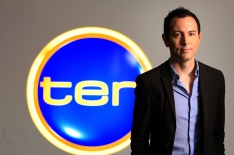Adam Boland: ‘Wake Up! didn’t know if it was an FM radio show or news program’
 Former executive producer of the Ten Network’s axed breakfast program Wake Up! Adam Boland has given new insight into the failures of the show, in his new book, arguing it didn’t know if it was a FM radio style program or a hard news program.
Former executive producer of the Ten Network’s axed breakfast program Wake Up! Adam Boland has given new insight into the failures of the show, in his new book, arguing it didn’t know if it was a FM radio style program or a hard news program.
In his new book Brekky Central, which was this week rushed into book stores in an attempt by the publisher to capitalise on publicity generated by Seven launching legal action to see the book, Boland writes how he originally conceived the show as something that “couldn’t take itself too seriously” and “fun and at times frivolous” but was later caught out by Ten’s shift to an older demographic which left the program with a “split personality”.
The declaration is one of a number of revelations that Boland canvasses in the book which also reveals his shock at the sudden sacking of Ten CEO James Warburton just three days after he agreed to join Ten, the emotional sacking of Natasha Exelby from Wake Up!, some of the internal dynamics within the Sunrise “family” and how he has been forced to reflect on why “I have left so many people in television hating me.”
In the book Boland speaks at length about the failures of the Wake Up! program acknowledging he was responsible for many of the major problems in the show.


The book is an indulgence from Boland whose actions and decisions left 68 people out of work at channel 10 many of whom followed him to TEN from other successful jobs. and he goes off to re-write history to make himself feel better. how shameful that this attention seeker is getting even more attention.
Self indulgence of the highest order…
Never worked with the guy but have to agree
To the above – Boland didn’t fire 68 people and he certainly didn’t force anyone to work for Channel 10. They all took a calculated risk that it would be successful and in the end it wasn’t.
More than 90% of business fail within the first 12 months – Channel 10 barely gave this a proper shot.
And good on him for telling his story – none of you guys above have to buy it. There will probably be a few others with mental illness who actually might relate to his experiences.
Give the guy a break.
The cover of the book has a banner reading “The Book that Channel Seven Tried to Stop.” This is a clear warning from the publisher that there is absolutely nothing interesting between the covers.
In another posting I make certain observations about Sunrise and I should know I was there from the beginning. Adam, donate a % of sales to Father Chris at Youth of the Streets as he had a strong relationship with the program, and The Koch family are very generous supporters of YOTS. I am a volunteer working with seriously dis affected kids as young as 11 and 12, Come out 1 night with us and see the real world.
This book is confirmation of my belief that you cannot hold down a job and make decisions while you have a mental illness. It works for a while but others in the workplace sense you are vulnerable, rounding up on you and stabbing you in the back constantly. I battled in the workforce for over ten years hating every minute of it, suffering a nervous breakdown whilst on holiday and attempting suicide when I was told my appointment was being annulled during the recession with a $25,000 car still to pay off. Putting work behind me and bowing to the inevitable and going on the Disability Support Pension was the best thing I ever did.
@mike I knew it wouldn’t be long before someone played the mental illness card!.
This whole exercise is massively self indulgent
It’s being billed as a ‘behind the scenes expose on breakfast TV’ which in itself is fine if you like that sort of thing, but any work you produce (albeit TV, book etc) is open to the public domain and therefore criticism. You can’t start shouting about depression every time someone says something you don’t like. If you don’t like it and are prone to react badly, don’t put yourself in that position in the first place
He got lucky with Kochie.
Adam who?
This guy reminds me of Kevin Rudd. Just won’t go away.